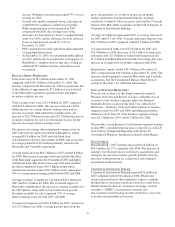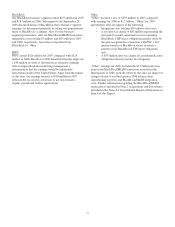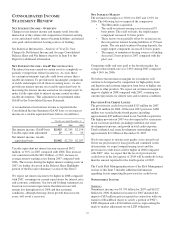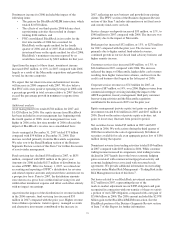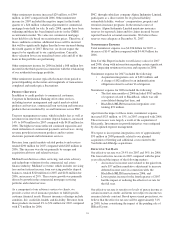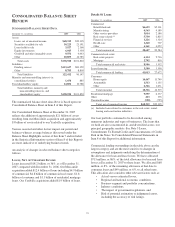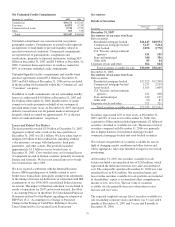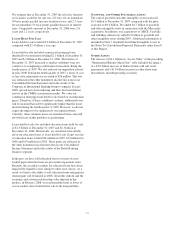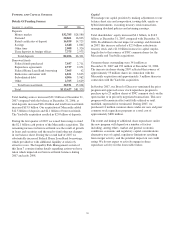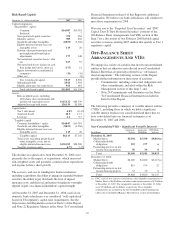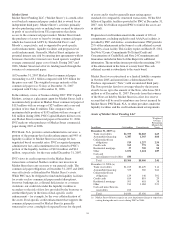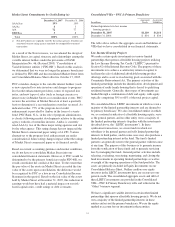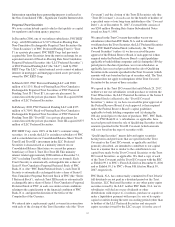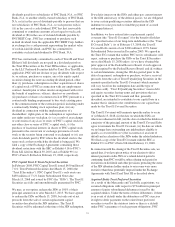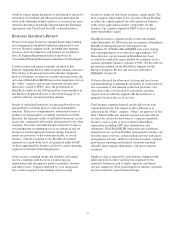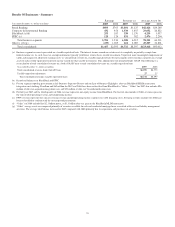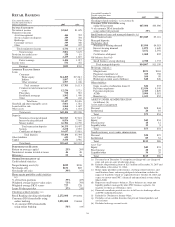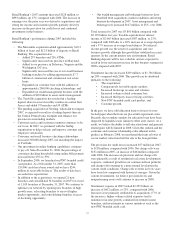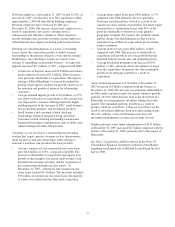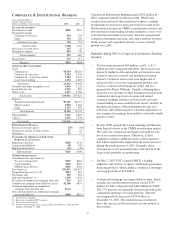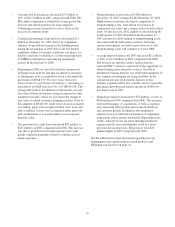PNC Bank 2007 Annual Report Download - page 35
Download and view the complete annual report
Please find page 35 of the 2007 PNC Bank annual report below. You can navigate through the pages in the report by either clicking on the pages listed below, or by using the keyword search tool below to find specific information within the annual report.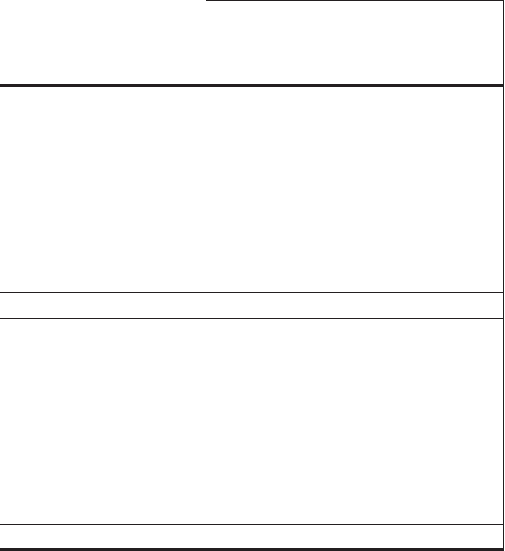
Market Street
Market Street Funding LLC (“Market Street”) is a multi-seller
asset-backed commercial paper conduit that is owned by an
independent third party. Market Street’s activities primarily
involve purchasing assets or making loans secured by interests
in pools of receivables from US corporations that desire
access to the commercial paper market. Market Street funds
the purchases of assets or loans by issuing commercial paper
which has been rated A1/P1 by Standard & Poor’s and
Moody’s, respectively, and is supported by pool-specific
credit enhancements, liquidity facilities and program-level
credit enhancement. Generally, Market Street mitigates its
potential interest rate risk by entering into agreements with its
borrowers that reflect interest rates based upon its weighted
average commercial paper cost of funds. During 2007 and
2006, Market Street met all of its funding needs through the
issuance of commercial paper.
At December 31, 2007 Market Street commercial paper
outstanding was $5.1 billion compared with $3.9 billion for
the prior year-end. The weighted average maturity of the
commercial paper was 32 days at December 31, 2007
compared with 23 days at December 31, 2006.
In the ordinary course of business during 2007, PNC Capital
Markets, acting as a placement agent for Market Street, held a
maximum daily position in Market Street commercial paper of
$113 million with an average of $27 million and a year-end
position of less than $1 million. This compares with a
maximum daily position of $105 million with an average of
$12 million during 2006. PNC Capital Markets did not own
any Market Street commercial paper at December 31, 2006.
PNC made no other purchases of Market Street commercial
paper during 2007 or 2006.
PNC Bank, N.A. provides certain administrative services, a
portion of the program-level credit enhancement and 99% of
liquidity facilities to Market Street in exchange for fees
negotiated based on market rates. PNC recognized program
administrator fees and commitments fees related to PNC’s
portion of the liquidity facilities of $12.6 million and $4.1
million, respectively, for the year ended December 31, 2007.
PNC views its credit exposure for the Market Street
transactions as limited. Neither creditors nor investors in
Market Street have any recourse to our general credit. The
commercial paper obligations at December 31, 2007 and 2006
were effectively collateralized by Market Street’s assets.
While PNC may be obligated to fund under liquidity facilities
for events such as commercial paper market disruptions,
borrower bankruptcies, collateral deficiencies or covenant
violations, our credit risk under the liquidity facilities is
secondary to the risk of first loss provided by the borrower or
another third party in the form of deal-specific credit
enhancement – for example, by the over collateralization of
the assets. Deal-specific credit enhancement that supports the
commercial paper issued by Market Street is generally
structured to cover a multiple of expected losses for the pool
of assets and is sized to generally meet rating agency
standards for comparably structured transactions. Of the $8.8
billion of liquidity facilities provided by PNC at December 31,
2007, only $2.8 billion required PNC to fund if the assets are
in default.
Program-level credit enhancement in the amount of 10% of
commitments, excluding explicitly rated AAA/Aaa facilities, is
provided by PNC and Ambac, a monoline insurer. PNC provides
25% of the enhancement in the form of a cash collateral account
funded by a loan facility. This facility expires on March 23, 2012.
See Note 5 Loans, Commitments To Extend Credit and
Concentrations of Credit Risk and Note 24 Commitments and
Guarantees included in Item 8 of this Report for additional
information. The monoline insurer provides the remaining 75%
of the enhancement in the form of a surety bond. The cash
collateral account is subordinate to the surety bond.
Market Street was restructured as a limited liability company
in October 2005 and entered into a Subordinated Note
Purchase Agreement (“Note”) with an unrelated third party.
The Note provides first loss coverage whereby the investor
absorbs losses up to the amount of the Note, which was $8.6
million as of December 31, 2007. Proceeds from the issuance
of the Note are held by Market Street in a first loss reserve
account that will be used to reimburse any losses incurred by
Market Street, PNC Bank, N.A. or other providers under the
liquidity facilities and the credit enhancement arrangements.
Assets of Market Street Funding LLC
In millions Outstanding Commitments
Weighted
Average
Remaining
Maturity In
Years
December 31, 2007 (a)
Trade receivables $1,375 $2,865 2.63
Automobile financing 1,387 1,565 4.06
Collateralized loan
obligations 519 1,257 2.54
Credit cards 769 775 .26
Residential mortgage 37 720 .90
Other 1,031 1,224 1.89
Cash and
miscellaneous receivables 186
Total $5,304 $8,406 2.41
December 31, 2006 (a)
Trade receivables $1,165 $2,429 2.14
Automobile financing 335 560 2.64
Collateralized loan
obligations 129 146 5.92
Credit cards 814 819 .29
Residential mortgage 501 618 .38
Other 914 1,084 2.21
Cash and miscellaneous
receivables 162
Total $4,020 $5,656 1.84
(a) Market Street did not recognize an asset impairment charge or experience
a rating downgrade on its assets during 2007 or 2006.
30


